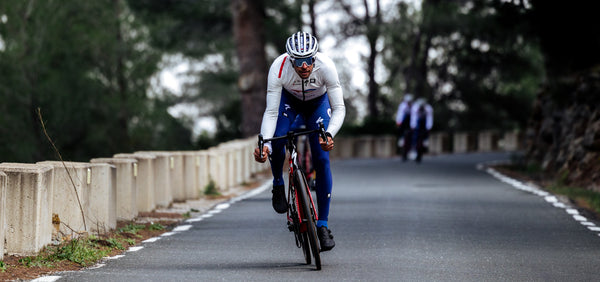This article was originally published in Issue 114. Support our journalism by subscribing here.
When it comes to self care, and the importance of having passions in life, Daniel Oss has clear ideas. Now in his 13th year as a professional cyclist, the 35-year-old is also a music lover and an enthusiastic bass player. He lives in Torbole, a small town in Trentino, Italy, on the shores of Lake Garda, and rides for Team TotalEnergies alongside his great friend Peter Sagan.
This year he rode his 10th Tour de France, but had to abandon the race on stage five, following a crash that fractured his cervical vertebrae. He uses his side project, Just Ride, to improve on his own terms and to balance out the stress of life as a professional athlete.
But we’ll get to that later. Let’s start at the beginning.
Daniel, what’s the hardest part of being a pro cyclist?
When you start out, it’s beautiful. There are so many expectations, but also a lot of unknowns. You’re kind of shitting it, it keeps you straight. When I think back to those early years, the main thing was just getting used to the lifestyle.
The first difficulty is physical: You go from racing 100 kilometres to races that are 200km or even 300km, like Milano-Sanremo. Stage races go from three or four days to Grand Tours lasting three weeks. And the amount of racing intensifies too, maybe from 40 days a season to almost 100.
It’s a different life, you need to find the time to train, but it’s also important to find some balance so that you can live the rest of your life, too.
Aside from that, you need to manage things like jetlag throughout the season. It’s not something most people think about, but it’s significant. Travelling is no longer about adventure, or discovering the world, it becomes a real stress and something that has to be carefully managed. You need to understand how and when to sleep so that you don’t arrive shattered; you have to be careful about what and when you eat in the airport or on the plane.
In short, there are a lot of things you need to learn just to do the job, and then, you hope, you can think about improving. A neo-pro is expected to deliver the maximum sporting performance, but also to grow and develop over time, so you need to give it absolutely everything.
Does it put a strain on relationships?
That’s another element of it. Everyone is expecting something from you. You’ve got team-mates, sports directors and managers,…

